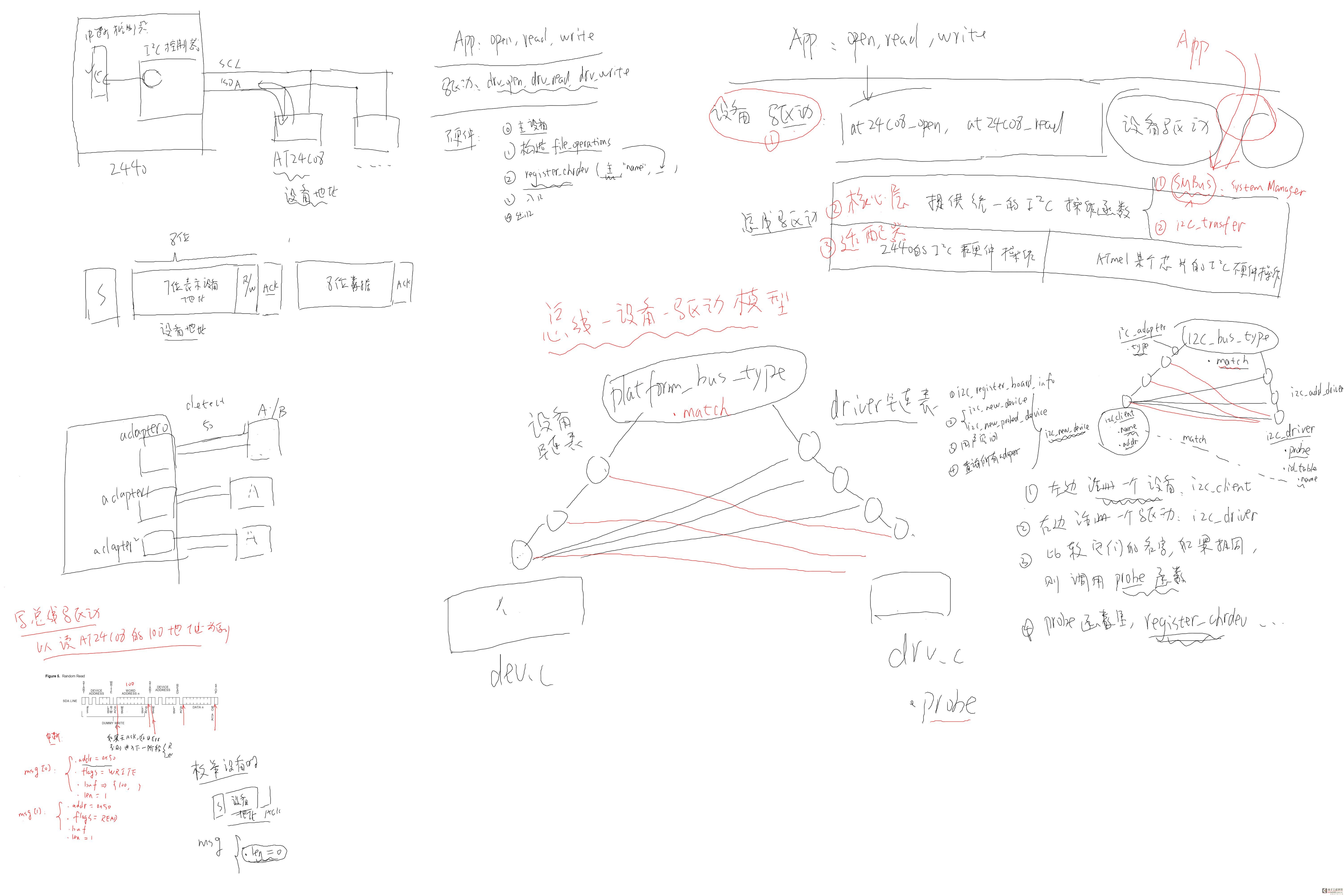#include "linux/kernel.h"#include "linux/module.h"
#include "linux/i2c.h"
#include "linux/init.h"
#include "linux/time.h"
#include "linux/interrupt.h"
#include "linux/delay.h"
#include "linux/errno.h"
#include "linux/err.h"
#include "linux/platform_device.h"
#include "linux/pm_runtime.h"
#include "linux/clk.h"
#include "linux/cpufreq.h"
#include "linux/slab.h"
#include "linux/io.h"
#include "linux/of_i2c.h"
#include "linux/of_gpio.h"
#include "plat/gpio-cfg.h"
#include "mach/regs-gpio.h"
#include "asm/irq.h"
#include "plat/regs-iic.h"
#include "plat/iic.h"
//#define PRINTK printk
#define PRINTK(...)
enum s3c24xx_i2c_state {
STATE_IDLE,
STATE_START,
STATE_READ,
STATE_WRITE,
STATE_STOP
};
struct s3c2440_i2c_regs {
unsigned int iiccon;
unsigned int iicstat;
unsigned int iicadd;
unsigned int iicds;
unsigned int iiclc;
};
struct s3c2440_i2c_xfer_data {
struct i2c_msg *msgs;
int msn_num;
int cur_msg;
int cur_ptr;
int state;
int err;
wait_queue_head_t wait;
};
static struct s3c2440_i2c_xfer_data s3c2440_i2c_xfer_data;
static struct s3c2440_i2c_regs *s3c2440_i2c_regs;
static void s3c2440_i2c_start(void)
{
s3c2440_i2c_xfer_data.state = STATE_START;
if (s3c2440_i2c_xfer_data.msgs->flags & I2C_M_RD) // 讀 //
{
s3c2440_i2c_regs->iicds = s3c2440_i2c_xfer_data.msgs->addr << 1;
s3c2440_i2c_regs->iicstat = 0xb0; // 主機(jī)接收��,啟動(dòng)
}
else // 寫 //
{
s3c2440_i2c_regs->iicds = s3c2440_i2c_xfer_data.msgs->addr << 1;
s3c2440_i2c_regs->iicstat = 0xf0; // 主機(jī)發(fā)送��,啟動(dòng)
}
}
static void s3c2440_i2c_stop(int err)
{
s3c2440_i2c_xfer_data.state = STATE_STOP;
s3c2440_i2c_xfer_data.err = err;
PRINTK("STATE_STOP, err = %dn", err);
if (s3c2440_i2c_xfer_data.msgs->flags & I2C_M_RD) // 讀 //
{
// 下面兩行恢復(fù)I2C操作��,發(fā)出P信號(hào)
s3c2440_i2c_regs->iicstat = 0x90;
s3c2440_i2c_regs->iiccon = 0xaf;
ndelay(50); // 等待一段時(shí)間以便P信號(hào)已經(jīng)發(fā)出
}
else // 寫 //
{
// 下面兩行用來恢復(fù)I2C操作�����,發(fā)出P信號(hào)
s3c2440_i2c_regs->iicstat = 0xd0;
s3c2440_i2c_regs->iiccon = 0xaf;
ndelay(50); // 等待一段時(shí)間以便P信號(hào)已經(jīng)發(fā)出
}
// 喚醒 //
wake_up(&s3c2440_i2c_xfer_data.wait);
}
static int s3c2440_i2c_xfer(struct i2c_adapter *adap,
struct i2c_msg *msgs, int num)
{
unsigned long timeout;
// 把num個(gè)msg的I2C數(shù)據(jù)發(fā)送出去/讀進(jìn)來 //
s3c2440_i2c_xfer_data.msgs = msgs;
s3c2440_i2c_xfer_data.msn_num = num;
s3c2440_i2c_xfer_data.cur_msg = 0;
s3c2440_i2c_xfer_data.cur_ptr = 0;
s3c2440_i2c_xfer_data.err = -ENODEV;
s3c2440_i2c_start();
// 休眠 //
timeout = wait_event_timeout(s3c2440_i2c_xfer_data.wait, (s3c2440_i2c_xfer_data.state == STATE_STOP), HZ * 5);
if (0 == timeout)
{
printk("s3c2440_i2c_xfer time outn");
return -ETIMEDOUT;
}
else
{
return s3c2440_i2c_xfer_data.err;
}
}
static u32 s3c2440_i2c_func(struct i2c_adapter *adap)
{
return I2C_FUNC_I2C | I2C_FUNC_SMBUS_EMUL | I2C_FUNC_PROTOCOL_MANGLING;
}
static const struct i2c_algorithm s3c2440_i2c_algo = {
// .smbus_xfer = ,
.master_xfer = s3c2440_i2c_xfer,
.functionality = s3c2440_i2c_func,
};
// 1. 分配/設(shè)置i2c_adapter
//
static struct i2c_adapter s3c2440_i2c_adapter = {
.name = "s3c2440_100ask",
.algo = &s3c2440_i2c_algo,
.owner = THIS_MODULE,
};
static int isLastMsg(void)
{
return (s3c2440_i2c_xfer_data.cur_msg == s3c2440_i2c_xfer_data.msn_num - 1);
}
static int isEndData(void)
{
return (s3c2440_i2c_xfer_data.cur_ptr >= s3c2440_i2c_xfer_data.msgs->len);
}
static int isLastData(void)
{
return (s3c2440_i2c_xfer_data.cur_ptr == s3c2440_i2c_xfer_data.msgs->len - 1);
}
static irqreturn_t s3c2440_i2c_xfer_irq(int irq, void *dev_id)
{
unsigned int iicSt;
iicSt = s3c2440_i2c_regs->iicstat;
if(iicSt & 0x8){ printk("Bus arbitration failednr"); }
switch (s3c2440_i2c_xfer_data.state)
{
case STATE_START : // 發(fā)出S和設(shè)備地址后,產(chǎn)生中斷 //
{
PRINTK("Startn");
// 如果沒有ACK, 返回錯(cuò)誤 //
if (iicSt & S3C2410_IICSTAT_LASTBIT)
{
s3c2440_i2c_stop(-ENODEV);
break;
}
if (isLastMsg() && isEndData())
{
s3c2440_i2c_stop(0);
break;
}
// 進(jìn)入下一個(gè)狀態(tài) //
if (s3c2440_i2c_xfer_data.msgs->flags & I2C_M_RD) // 讀 //
{
s3c2440_i2c_xfer_data.state = STATE_READ;
goto next_read;
}
else
{
s3c2440_i2c_xfer_data.state = STATE_WRITE;
}
}
case STATE_WRITE:
{
PRINTK("STATE_WRITEn");
// 如果沒有ACK, 返回錯(cuò)誤 //
if (iicSt & S3C2410_IICSTAT_LASTBIT)
{
s3c2440_i2c_stop(-ENODEV);
break;
}
if (!isEndData()) // 如果當(dāng)前msg還有數(shù)據(jù)要發(fā)送 //
{
s3c2440_i2c_regs->iicds = s3c2440_i2c_xfer_data.msgs->buf[s3c2440_i2c_xfer_data.cur_ptr];
s3c2440_i2c_xfer_data.cur_ptr++;
// 將數(shù)據(jù)寫入IICDS后�,需要一段時(shí)間才能出現(xiàn)在SDA線上
ndelay(50);
s3c2440_i2c_regs->iiccon = 0xaf; // 恢復(fù)I2C傳輸
break;
}
else if (!isLastMsg())
{
// 開始處理下一個(gè)消息 //
s3c2440_i2c_xfer_data.msgs++;
s3c2440_i2c_xfer_data.cur_msg++;
s3c2440_i2c_xfer_data.cur_ptr = 0;
s3c2440_i2c_xfer_data.state = STATE_START;
// 發(fā)出START信號(hào)和發(fā)出設(shè)備地址 //
s3c2440_i2c_start();
break;
}
else
{
// 是最后一個(gè)消息的最后一個(gè)數(shù)據(jù) //
s3c2440_i2c_stop(0);
break;
}
break;
}
case STATE_READ:
{
PRINTK("STATE_READn");
// 讀出數(shù)據(jù) //
s3c2440_i2c_xfer_data.msgs->buf[s3c2440_i2c_xfer_data.cur_ptr] = s3c2440_i2c_regs->iicds;
s3c2440_i2c_xfer_data.cur_ptr++;
next_read:
if (!isEndData()) // 如果數(shù)據(jù)沒讀完, 繼續(xù)發(fā)起讀操作 //
{
if (isLastData()) // 如果即將讀的數(shù)據(jù)是最后一個(gè), 不發(fā)ack //
{
s3c2440_i2c_regs->iiccon = 0x2f; // 恢復(fù)I2C傳輸,接收到下一數(shù)據(jù)時(shí)無ACK
}
else
{
s3c2440_i2c_regs->iiccon = 0xaf; // 恢復(fù)I2C傳輸��,接收到下一數(shù)據(jù)時(shí)發(fā)出ACK
}
break;
}
else if (!isLastMsg())
{
// 開始處理下一個(gè)消息 //
s3c2440_i2c_xfer_data.msgs++;
s3c2440_i2c_xfer_data.cur_msg++;
s3c2440_i2c_xfer_data.cur_ptr = 0;
s3c2440_i2c_xfer_data.state = STATE_START;
// 發(fā)出START信號(hào)和發(fā)出設(shè)備地址 //
s3c2440_i2c_start();
break;
}
else
{
// 是最后一個(gè)消息的最后一個(gè)數(shù)據(jù) //
s3c2440_i2c_stop(0);
break;
}
break;
}
default: break;
}
// 清中斷 //
s3c2440_i2c_regs->iiccon &= ~(S3C2410_IICCON_IRQPEND);
return IRQ_HANDLED;
}
//
* I2C初始化
//
static void s3c2440_i2c_init(void)
{
struct clk *clk;
clk = clk_get(NULL, "i2c");
clk_enable(clk);
// 選擇引腳功能:GPE15:IICSDA, GPE14:IICSCL
s3c_gpio_cfgpin(S3C2410_GPE(14), S3C2410_GPE14_IICSCL);
s3c_gpio_cfgpin(S3C2410_GPE(15), S3C2410_GPE15_IICSDA);
// bit[7] = 1, 使能ACK
* bit[6] = 0, IICCLK = PCLK/16
* bit[5] = 1, 使能中斷
* bit[3:0] = 0xf, Tx clock = IICCLK/16
* PCLK = 50MHz, IICCLK = 3.125MHz, Tx Clock = 0.195MHz
//
s3c2440_i2c_regs->iiccon = (1<<7) | (0<<6) | (1<<5) | (0xf); // 0xaf
s3c2440_i2c_regs->iicadd = 0x10; // S3C24xx slave address = [7:1]
s3c2440_i2c_regs->iicstat = 0x10; // I2C串行輸出使能(Rx/Tx)
}
static int i2c_bus_s3c2440_init(void)
{
// 2. 硬件相關(guān)的設(shè)置 //
s3c2440_i2c_regs = ioremap(0x54000000, sizeof(struct s3c2440_i2c_regs));
s3c2440_i2c_init();
request_irq(IRQ_IIC, s3c2440_i2c_xfer_irq, 0, "s3c2440-i2c", NULL);
init_waitqueue_head(&s3c2440_i2c_xfer_data.wait);
// 3. 注冊(cè)i2c_adapter //
i2c_add_adapter(&s3c2440_i2c_adapter);
return 0;
}
static void i2c_bus_s3c2440_exit(void)
{
i2c_del_adapter(&s3c2440_i2c_adapter);
free_irq(IRQ_IIC, NULL);
iounmap(s3c2440_i2c_regs);
}
module_init(i2c_bus_s3c2440_init);
module_exit(i2c_bus_s3c2440_exit);
MODULE_LICENSE("GPL");
==============================================================
解析:
編寫"總線(適配器adapter)"驅(qū)動(dòng)
Device Drivers
I2C support
I2C Hardware Bus support
< > S3C2410 I2C Driver
nfs 30000000 192.168.1.123:/work/nfs_root/uImage_noi2cbus; bootm 30000000
應(yīng)用程序發(fā)送消息出去時(shí),會(huì)調(diào)用適配器adapter里面的算法函數(shù)algo里面的master_xfer函數(shù)�����,先把消息記錄下來之后調(diào)用start函數(shù)����,start函數(shù)里發(fā)送start啟動(dòng)信號(hào)并且把設(shè)備地址發(fā)送出去��,然后休眠���。發(fā)送完之后產(chǎn)生一個(gè)中斷���,在中斷函數(shù)里面讀出狀態(tài),如果沒有ack的話認(rèn)為發(fā)生錯(cuò)誤發(fā)出停止信號(hào)喚醒應(yīng)用程序����;如果有ack信號(hào)而且是最后一個(gè)消息,最后一個(gè)數(shù)據(jù)則發(fā)出停止信號(hào)�����,否則進(jìn)入下一個(gè)狀態(tài)讀/寫��,如果是寫判斷是否是最后一個(gè)數(shù)據(jù),若還有數(shù)據(jù)要發(fā)送把數(shù)據(jù)發(fā)送出去��,若是最后一個(gè)數(shù)據(jù)但是不是最后一個(gè)消息的話開始處理下一個(gè)消息��,發(fā)出start信號(hào)和設(shè)備地址�,若是最后一個(gè)消息的最后一個(gè)數(shù)據(jù)則發(fā)出停止信號(hào);如果是讀判斷數(shù)據(jù)是否讀完��,如果沒有讀完但是接收到的不是最后一個(gè)數(shù)據(jù)則發(fā)送ack信號(hào)��,若接收到最后一個(gè)數(shù)據(jù)否則無ack�,但若數(shù)據(jù)已經(jīng)讀完則處理下一個(gè)消息發(fā)送start信號(hào)。




評(píng)論